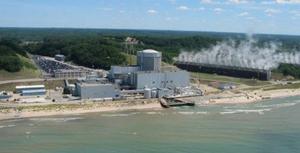Nuclear powerNRC sees no evidence of bad security practices at Michigan nuclear plant
The Nuclear Regulatory Committee (NRC) released information last week about a leak earlier this summer at the Palisades plant near South Haven, Michigan; the plant has been mired in controversy this year, as at least three water leaks have occurred in the past several months, and the plant has one of the worst safety ratings in the United States

Michigan's Palisades nuclear power plant // Source: nrc.gov
The Nuclear Regulatory Committee (NRC) released information last week about a leak earlier this summer at the Palisades plant near South Haven, Michigan.
The plant has been mired in controversy this year, as at least three water leaks have occurred in the past several months and the plant has one of the worst safety ratings in the United States.
Michigan Radio reports that the water leak occurred in the actual vessel that held the nuclear reactor. The NRC shut the plant down so the problem could be fixed but the Palisades has since reopened.
NRC branch chief Jack Giessner thinks that it was a good idea to shut the plant down and make changes to regulations in order to improve issues. “I think they were prompt to shut down. I think the NRC’s assessment when they were getting ready to start up we weren’t happy with their performance in that case and we took specific action.” Giessner told Michigan Radio.
Regulators still do not know how the hole was created. Giessner said that there was a similar leak from the control rod drive mechanisms (CRDMs) in the past. “All the CRDMs were replaced in 2001. That was one of the drivers for why we did a special inspection. We said ‘hey it’s only been 11 years and we have another through wall leak’ albeit in a different location.” Giessner said.
An independent safety assessment done last spring said there was a “repeated emphasis of production over safety.” Due to recent safety problems, the NRC has taken the special step of releasing the preliminary results of this investigation.
Giessner said it is not clear how the hole formed and Palisades’s operators believe it could have formed slowly over the last eight years, but Giessner thinks it could have happened over the course of two years.
Giessner estimates up to 10,000 gallons of water leaked from the primary system over thirty-three days. In total the system holds up to 80,000 gallons.
When it comes to the potential of public contamination, Giessner says the water was contained in the building and processed as normal radioactive liquid, so there were to safety concerns to the public.
The final results of the investigation will be released in a few months. For now the NRC is dealing with an even bigger investigation of the same plant, having to do with the culture of security at the plant. The results of the investigation will impact the plant’s safety rating, rating which has already been downgraded.
